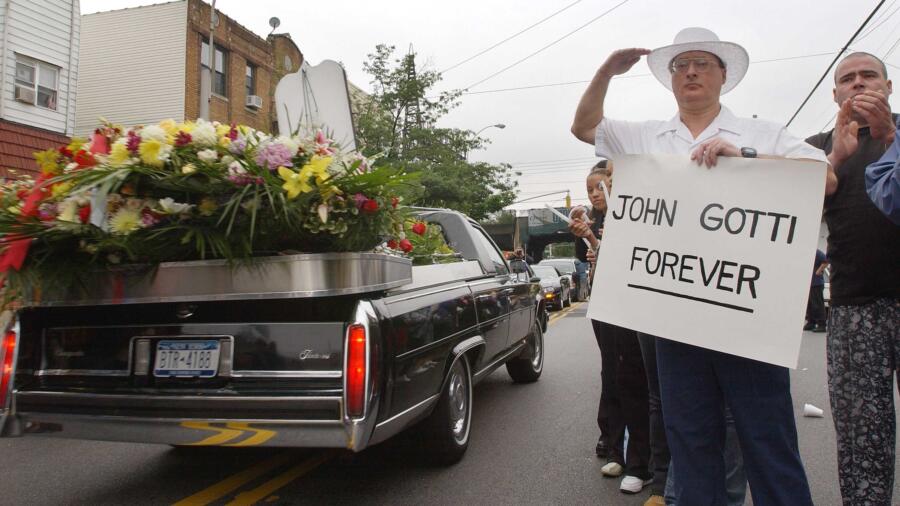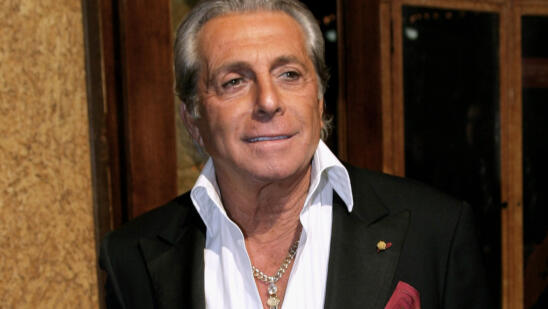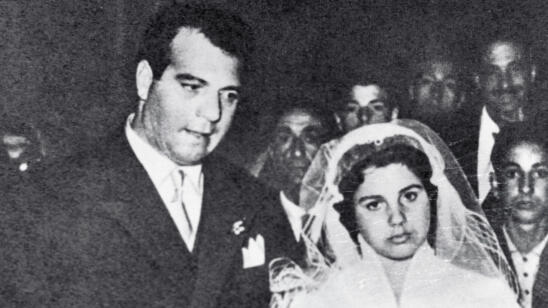An outsider would have thought the yellow ribbons tied around trees in Howard Beach, Queens in 1987 were in support of U.S. troops and that protesters carrying signs of support outside the Federal District Court in Brooklyn in 1992 were for a civil-rights activist, unjustly arrested. But these tokens of encouragement were for a mobster: John Gotti, the head of the Gambino crime family.
In the 1980s the “Dapper Don” was known for avoiding prison time just as much as he was known for his flashy suits and big neighborhood parties.
But his involvement in organized crime eventually came to an end on April 2, 1992, when he was found guilty of 13 counts of racketeering and murder. Gotti was sentenced to life in prison without the possibility of parole and died 10 years later, on June 10, 2002, of throat cancer.
[Watch Gotti: Godfather & Son in the A&E App.]
The documentary Gotti: Godfather & Son explores the complicated relationship between John Gotti and his son, John Gotti Jr.—who allegedly replaced his father as the Gambino crime boss when the elder Gotti went to prison. But “Junior” claims he’s now out of the Mafia and, in the show, he explains how tough it was to get his father’s blessing to put his criminal life behind him.
A&E True Crime spoke with one of the people interviewed for the special, Murray Weiss, a veteran journalist who has covered organized crime for over 30 years and who is now at CBS News. He tells us why working-class people loved John Gotti, how the Mafia has changed since the 1980s and what it was like for John Gotti Jr. to leave the mob.
How did John Gotti treat most of his neighbors?
John Gotti was well-liked by his community. He was sort of a hero to them and he treated them very well. I’d almost say, he was a terrific neighbor in many respects; he was also brilliantly public-relations minded.
He threw these massive parties—July 4th parties with fireworks and barbecues. His presence there, along with the presence of a lot of organized-crime figures in his area, had a colossal impact in that people…were looking for homes to burglarize or people to rob back in that era when crime was extraordinarily high in New York. [Those] people knew to stay out of his neighborhood because there would be serious repercussions and hell to pay if [his people] caught you. So he had a double impact.
Were the barbecues and parties all just for show or did he genuinely care about his community?
He cared, but I think he was being flamboyant. Being John Gotti was part who he was—the big boss, the power guy. He was the head of a crime family, he was out there, he was very public. And a lot of those things, people gravitated to.
[Watch Gotti: Godfather & Son on A&E Crime Central.]
As long as he was beating the government every time he got arrested, it only enhanced his image. Although, ultimately, being so high-profile—which was uncharacteristic of people in the mafia—led to his undoing.
Why did the working-class people in his neighborhood love him?
John Gotti was well liked for a number of reasons, beyond just his neighborhood. He was a charismatic guy, he was very out there, he was a very handsome, good-looking man. He came from a very rough, hard background, so nobody saw him as some elitist who inherited a lofty position in organized crime from a father or a relative. He fought his way out of desperately poor circumstances when he grew up, so on that level, working guys like him.
But the whole allure of the mafia to the working class, or to people in general, adds to it: It’s a secret society. They’re a group of people who—unlike working-class people—have their own hours. They keep to themselves, they have friends, they go out when they want, they have money to burn, some of them have women on the side, they have a lot of power—secret power, real power, they have the power to control things—which they did in that era. The mafia hand in New York was incredibly broad and it virtually controlled vast industries and parts of New York City, in hidden ways and not-so-hidden ways.
People who go to work 9-to-5 or have steady jobs…they’re honest people. They’re not taking shortcuts, they’re not stealing your money, they’re not scaring you into giving them money. But the allure of the mafia is they have the ability to go all hours, go all places [and] have their own little clubs.
John Gotti, unlike most other mob bosses, stepped into the public eye. He was an attractive character. He was wearing $3,000 suits, and that was in the 1980s! He was a flashy, in-your-face, you’ll-never-catch-me kind of John Dillinger, Al Capone, latter-day guy.
And then, when the government started arresting him and he was [winning] cases…he took on a greater life. He became the Teflon Don. He’s the guy who sits in the courtroom and wins and pounds the table in victory and strolls out into the street and there are hundreds and hundreds of people cheering him on. It took on an enormous life from a public-persona view. He started gracing the covers of magazines.
That’s why, to a lot of working-class people, there’s always some sort of affinity to the rogue guy who’s beating the system, having a grand old time for himself.
But behind all of that, what the mafia really is and what they do is not always so glamorous.
Do popular movies like ‘Goodfellas’ and ‘A Bronx Tale,’ romanticize the mob?
They romanticize in a lot of ways [but] they don’t really show the monotony of being in organized crime. Not everybody is wearing silk suits: There are the earners and there are the grunts who were doing a lot of work.
The criminal activity is very much in passing in these movies. You get a glimpse of it, but even that doesn’t fully convey how brutal and how destructive some of it is—not just to the people directly, but what it was doing to unions, to industries in New York City, how much it affected tax payers.
At one point, in New York City, you couldn’t pour a cubic yard of concrete without organized crime getting a chunk of that money. It was almost like a built-in tax to doing business in New York. They controlled so many industries—from the trucks to the concrete to the garbage to labor unions, the ports [and] containers that tried to come in through the waterfront.
Do you think people just consciously ignored John Gotti’s criminal behavior? Or was his criminal behavior part of his appeal?
Yes, I think most people were ignoring the real criminal activity. They don’t really know what it is. No matter how much you report on it, you read about mob wars and they’re killing each other, but the more subtle aspects of what it really means, they kind of ignore.
The bedrock of organized crime was founded on things like bookmaking and extortion. Extortion is an unbelievably horrible concept: You own a business, they come to your [business] and say ‘You gotta give us some money or we’re going to blow up your business.’
But [for] people who bet on sports…they need a bookmaker, and the bookmaker is a part of organized crime. You don’t have an instinctive disdain for what they’re doing because it’s a user-friendly thing.
But then [the mob] branched out and started taking over unions and no-show jobs. You’re trying to work and you’re a legitimate guy, [but] you can’t get a job because you don’t know the mob guy who’s got the control there.
They took ill-gotten money from things like pornography and prostitution and loan sharking and betting and they turned it into an enormous empire here in the United States, which, of course, has been rolled back in the past couple of decades.
Do you think the Mafia in New York City is the same today as it was in the ’80s?
No. It’s not the same.
Why?
I think the singularly most important reason was the legislation that created the RICO Act: the Racketeer Influenced and Corrupt Organization Act. Prior to that…they’d actually get arrested, but they’d get arrested for a singular crime. Maybe they hijacked a truck coming out of JFK airport that had furs. They’d get captured, but they’d do some time—one year, two years, three years, and then they’d come out and go back to doing what they were doing [before].
What the racketeering-and-influence law did was [it] allowed the government to charge them as an ongoing criminal enterprise. Now they started arresting these guys and they’re facing serious federal time. They’re not doing two years and coming back. They’re doing eight years, 10 years, 15 years, 20 years, maybe life depending on what they call predicate acts, the acts that were committed under the umbrella of racketeering.
[The widespread use of the RICO Act in New York] really changed the landscape. And that was in the ’80s; it gave prosecutors an unbelievable weapon. Once they started getting guys who are starting to face serious time, that’s when some of them started to cooperate with the government. They didn’t want to do the kind of time that they were facing. The stakes got higher and the people without the stomach to do that kind of time rolled over.
From your experience covering organized crime, have you ever heard of anyone, aside from John Gotti Jr., who tried to leave the Mafia?
Michael Franzese, he was a son of a major mob boss, Sonny Franzese, and he left the Mafia, allegedly, well before Junior. So there is some precedent. Not everybody thinks he truly left, but I think he may have been the first.
Obviously the guys who cooperated and went into the witness-protection program left the Mafia, but for different reasons, in different ways.
Do you believe that John Gotti Jr. is out of the mob? He says he is.
Yeah, I guess I believe it.
Do you know what John Gotti Jr. does for a living? How he makes money?
That’s a very good question. You have to ask him.
Did John Gotti Jr. face a lot of opposition when he said he wanted to leave the mob?
He wasn’t very well liked. He wasn’t quite as pleasant as he is now. He threw his weight around based on who his father was.
He was anointed by his father to have power inside the family and a lot of people resented it. He did things that brought problems on himself, that offended people inside the mob, that brought problems to the mob.
I think when he wanted to sidle away from the mob, to some degree, they were happy to part ways with him. I don’t think it was like ‘You can’t leave.’ There was not a fight to keep him.
They trusted [because] he was free…he didn’t have to cooperate [with the government]. It was a mutual parting of the ways. [But] I think there’s always the possibility of [if] you don’t behave yourself, something bad could happen to you.
Junior’s free and as long as he lives the kind of life he’s leading now, he’ll be fine. But if he starts stepping into some areas, or going back to things, or reveals things, or talks about things, who knows who he could upset.
Related Features:
Jimmy Hoffa: The Most Credible and Most Outlandish Theories About His Death
What’s It Really Like in the Federal Witness Protection Program?
How Mobster Whitey Bulger Evaded Law Enforcement for So Long
‘The Iceman’: An Undercover Agent Reflects on Taking Down Notorious Hitman Richard Kuklinski


